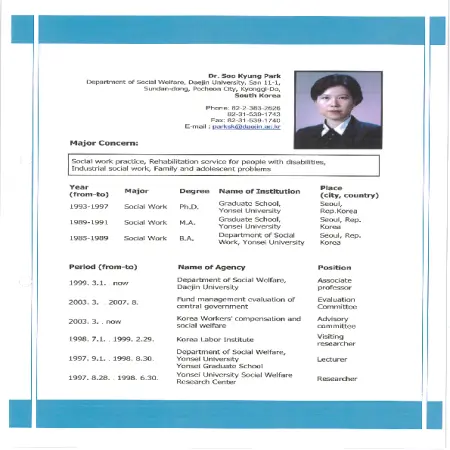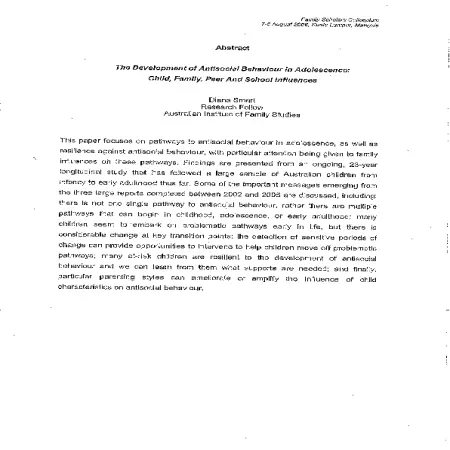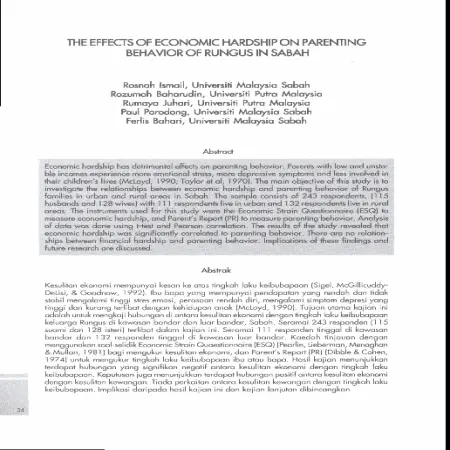Browse by Division/Agency
Results for Division/Agency : "LPPKN - National Population and Family Development Board, Malaysia: Family Well-Being Division"
|
|
The effect of negative and supportive behaviors of their parents and friends on substance abuse risk among Korean adolescents and implications for family resilience intervention: gender differences
Item Type: Conference or Workshop Item
Editor:
Year: 00/00/2009
Abstract: Substances use among adolescents is particularly because early initiation of substance not only leads to many detrimental impacts on their lives but also is predictive of both increased use and more serious patterns of use in their adulthood. Thus, it is important to identify potential substance users and factors related to substance use because these efforts may provide important information to help adolescents who are at high risk for substance use. Many studies documented that parental alcoholism and peer substance use are the most predictive risk factors for substance use among adolescents. On the other hand, there is ongoing debate among researchers on the influence of social support from family and friends on substance use by adolescents. Also, individual factors such as self-esteem, emotional coping, and academic performance have been shown to be associated with substance use among adolescents. Unlike western society, little is known about gender difference in the prevalence and correlates of substance use among adolescents in South Korea. Accordingly, this study aimed to identify the prevalence of substance abuse risk among South Korean adolescents and to examine the effects of negative and supportive of parents on their substance abuse risk by gender. The participants were 1,981 high school youths between the ages of 16 and 19 years (mean, 17.69) residing in Seoul city. Data collection was conducted conveniently choosing high schools in Seoul. Participants completed a self-report survey which included measures of substances abuse risk of adolescent and his or her best friend (using a POSIT scale), parental alcoholism (using the CAST), supportive behaviors from either parent or friend (using multidimensional scale of Perceived Social Support), Rosenberg's self-esteem scale, COPE scale developed by Carver et al. and gender, age, perceived economic status and academic performance.
|
|
|
|
|
|
The 3rd East Asia Ministerial Forum on Families, "Strengthening family resilience: moving from policy to action",Bali Indonesia ,17-19 November 2008
Item Type: Country Statement
Editor:
Year: 00/11/2008
Abstract: The family institution performs multifaceted functions in the development and well-being of its members. In order to enable the family institution to fulfill its societal roles and responsibilities, it requires support from the state, civil society and from family members themselves. In this regard, it is essential that we examine
social services policies from the family and not just from the individual
perspective and whether they contribute towards the strengthening of
family resilience. Effective support and protection to families and their
individual members requires that services respond appropriately to the
needs that exist at different stages of the family lifecycle and the individual
lifespan.
|
|
|
|
|
|
The development of antisocial behaviour in adolescence: child,family, peer and school influences
Item Type: Conference or Workshop Item
Editor:
Year: 00/00/2006
Abstract: This paper focuses on pathways to antisocial behaviour in adolescence, as well as resilience against antisocial behaviour, with particular attention being given to family influences on these pathways. Findings are presented from an ongoing, 23-year longitudinal study that has followed a large sample of Australian children from infancy to early adulthood thus far. Some of the important messages emerging from the three large reports completed between 2002 and 2005 are discussed, including: there is not one single pathway to antisocial behaviour, rather there are multiple pathways that can begin in childhood, adolescence, or early adulthood. Many children seem to embark on problematic pathways early in life, but there is considerable change at key transition points; the detection of sensitive periods of change can provide opportunities to intervene to help children move off problematic pathways; many at-risk children are resilient to the development of antisocial behaviour and we can learn from them what supports are needed; and finally, particular parenting styles can ameliorate or amplify the influence of child characteristics on antisocial behaviour.
|
|
|
|
|
|
The effects of economic hardship on parenting behavior of Rungus in Sabah
Item Type: Article
Editor:
Year: 00/01/2004
Abstract: Economic hardship has detrimental effect on parenting behavior. Parents with low and unstable incomes experience more emotional stress, more depressive symptoms and less involved in the children's lives (McLoyd,1990;Taylor et al, 1970). The main objective of this study is to investigate the relationship between economic hardship and parenting behavior of Rungus families in urban and rural areas in Sabah. The sample consists of 243 respondents, (115 husbands and 128 wives) with 111 respondents live in urban and 132 respondents live in rural areas. The instrument used for this study were the Economic Strain Questionnaire (ESQ) to measure economic hardship, and Parent,s report (PR) to measure parenting behavior. Analysis of data was done using t-test and Pearson correlation. The result of the study revealed that economic hardship was significantly correlated to parenting behavior. There are no relationship between financial hardship and parenting behavior. Implications of these findings and future research are discussed.
|
|
|
|








